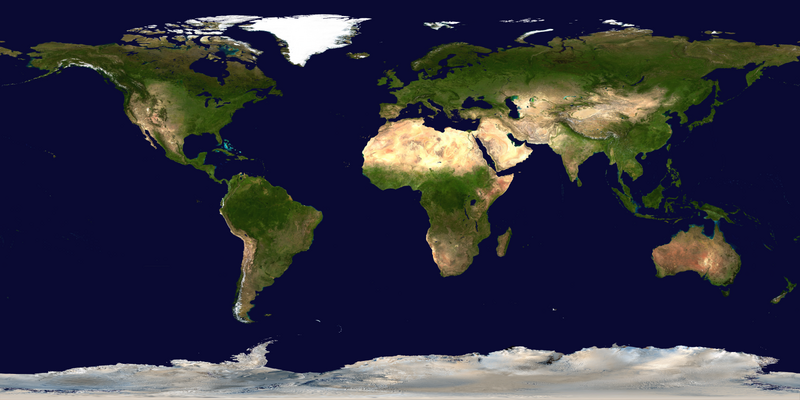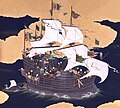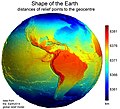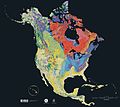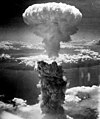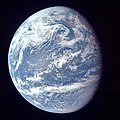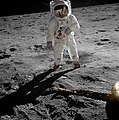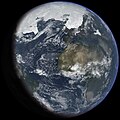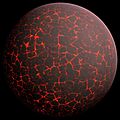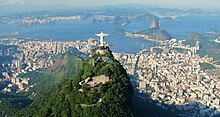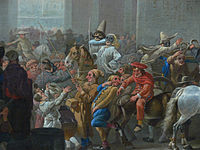|
| Portal maintenance status: (No date set)
|
The World Portal

The world is the totality of entities, the whole of reality, or everything that exists. The nature of the world has been conceptualized differently in different fields. Some conceptions see the world as unique while others talk of a "plurality of worlds". Some treat the world as one simple object while others analyze the world as a complex made up of parts.
In scientific cosmology, the world or universe is commonly defined as "[t]he totality of all space and time; all that is, has been, and will be". Theories of modality talk of possible worlds as complete and consistent ways how things could have been. Phenomenology, starting from the horizon of co-given objects present in the periphery of every experience, defines the world as the biggest horizon or the "horizon of all horizons". In philosophy of mind, the world is contrasted with the mind as that which is represented by the mind. Theology conceptualizes the world in relation to God, for example, as God's creation, as identical to God or as the two being interdependent. In religions, there is a tendency to downgrade the material or sensory world in favor of a spiritual world to be sought through religious practice. A comprehensive representation of the world and our place in it, as is found in religions, is known as a worldview. Cosmogony is the field that studies the origin or creation of the world while eschatology refers to the science or doctrine of the last things or of the end of the world.
In various contexts, the term "world" takes a more restricted meaning associated, for example, with the Earth and all life on it, with humanity as a whole or with an international or intercontinental scope. In this sense, world history refers to the history of humanity as a whole and world politics is the discipline of political science studying issues that transcend nations and continents. Other examples include terms such as " world religion", " world language", " world government", " world war", " world population", " world economy", or " world championship". ( Full article...)
Selected articles - show another
-
Image 1
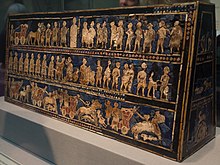
Ancient history is a time period from the beginning of writing and recorded human history through late antiquity. The span of recorded history is roughly 5,000 years, beginning with the development of Sumerian cuneiform script and continuing until the expansion of Islam in late antiquity. Ancient history covers all continents inhabited by humans in the period 3000 BC – AD 750. The three-age system periodizes ancient history into the Stone Age, the Bronze Age, and the Iron Age, with recorded history generally considered to begin with the Bronze Age. The start and end of the three ages vary between world regions. In many regions the Bronze Age is generally considered to begin a few centuries prior to 3000 BC, while the end of the Iron Age varies from the early first millennium BC in some regions to the late first millennium AD in others.
During the time period of ancient history, the world population was already exponentially increasing due to the Neolithic Revolution, which was in full progress. While in 10,000 BC, the world population stood at 2 million, it rose to 45 million by 3,000 BC. By the Iron Age in 1000 BC, the population had risen to 72 million. By the end of the ancient period in AD 500, the world population is thought to have stood at 209 million. In 10,500 years, the world population increased by 100 times. ( Full article...) -
Image 2
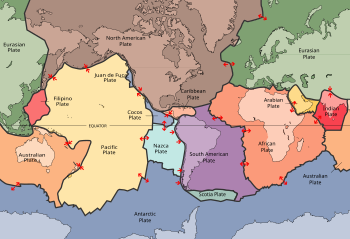
Plates in the crust of Earth
Earth's crust is its thick outer shell of rock, referring to less than 1% of the planet's radius and volume. It is the top component of the lithosphere, a division of Earth's layers that includes the crust and the upper part of the mantle. The lithosphere is broken into tectonic plates whose motion allows heat to escape the interior of Earth into space.
The crust lies on top of the mantle, a configuration that is stable because the upper mantle is made of peridotite and is therefore significantly denser than the crust. The boundary between the crust and mantle is conventionally placed at the Mohorovičić discontinuity, a boundary defined by a contrast in seismic velocity. ( Full article...) -
Image 3Nuclear proliferation is the spread of nuclear weapons, fissionable material, and weapons-applicable nuclear technology and information to nations not recognized as " Nuclear Weapon States" by the Treaty on the Non-Proliferation of Nuclear Weapons, commonly known as the Non-Proliferation Treaty or NPT. Proliferation has been opposed by many nations with and without nuclear weapons, as governments fear that more countries with nuclear weapons will increase the possibility of nuclear warfare (up to and including the so-called countervalue targeting of civilians with nuclear weapons), de-stabilize international or regional relations, or infringe upon the national sovereignty of nation states.
Four countries besides the five recognized Nuclear Weapon States have acquired, or are presumed to have acquired, nuclear weapons: India, Pakistan, North Korea, and Israel. None of these four are a party to the NPT, although North Korea acceded to the NPT in 1985, then withdrew in 2003 and conducted its first nuclear test in 2006. One critique of the NPT is that the treaty is discriminatory in the sense that only those countries that tested nuclear weapons before 1968 are recognized as nuclear weapon states while all other states are treated as non-nuclear-weapon states who can only join the treaty if they forswear nuclear weapons. ( Full article...) -
Image 4The United Nations uses three definitions for what constitutes a city, as not all cities in all jurisdictions are classified using the same criteria. Cities may be defined as the cities proper, the extent of their urban area, or their metropolitan regions. ( Full article...)
-
Image 5

Topography globe featuring physical features of the Earth
A globe is a spherical model of Earth, of some other celestial body, or of the celestial sphere. Globes serve purposes similar to maps, but, unlike maps, they do not distort the surface that they portray except to scale it down. A model globe of Earth is called a terrestrial globe. A model globe of the celestial sphere is called a celestial globe.
A globe shows details of its subject. A terrestrial globe shows landmasses and water bodies. It might show nations and major cities and the network of latitude and longitude lines. Some have raised relief to show mountains and other large landforms. A celestial globe shows notable stars, and may also show positions of other prominent astronomical objects. Typically, it will also divide the celestial sphere into constellations. ( Full article...) -
Image 6
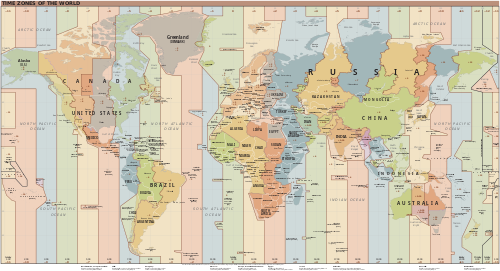
Time zones of the world
A time zone is an area which observes a uniform standard time for legal, commercial and social purposes. Time zones tend to follow the boundaries between countries and their subdivisions instead of strictly following longitude, because it is convenient for areas in frequent communication to keep the same time.
Each time zone is defined by a standard offset from Coordinated Universal Time (UTC). The offsets range from UTC−12:00 to UTC+14:00, and are usually a whole number of hours, but a few zones are offset by an additional 30 or 45 minutes, such as in India and Nepal. Some areas in a time zone may use a different offset for part of the year, typically one hour ahead during spring and summer, a practice known as daylight saving time (DST). ( Full article...) -
Image 7

An oryx in the Wildlife Reserve in Al Wusta in 2012. The reserve was formerly the Arabian Oryx Sanctuary, a UNESCO World Heritage Site that was delisted in 2007.
World Heritage Sites may lose their designation when the UNESCO World Heritage Committee determines that they are not properly managed or protected. The committee can place a site it is concerned about on its list of World Heritage in Danger of losing its designation, and attempts to negotiate with the local authorities to remedy the situation. If remediation fails, the committee then revokes its designation.
A country may also request to reduce the boundaries of one of its existing sites, in effect partially or fully delisting such properties. Under the World Heritage guidelines, a country must report to the committee whenever one of its properties "inscribed on the World Heritage List has seriously deteriorated, or when the necessary corrective measures have not been taken." ( Full article...)
General images - load new batch
-
Image 2A High Desert storm, sweeps across the Mojave (from Earth)
-
Image 3Japanese depiction of a Portuguese carrack. European maritime innovations led to proto-globalization.
-
Image 4First airplane, the Wright Flyer, flew on 17 December 1903.
-
Image 5The Pantheon, originally a Roman temple, now a Catholic church
-
Image 9A 580 million year old fossil of Spriggina floundensi, an animal from the Ediacaran period. Such life forms could have been ancestors to the many new forms that originated in the Cambrian Explosion. (from History of Earth)
-
Image 10 Tracy Caldwell Dyson, a NASA astronaut, observing Earth from the Cupola module at the International Space Station on 11 September 2010 (from Earth)
-
Image 11" Lucy", the first Australopithecus afarensis skeleton found. Lucy was only 1.06 m (3 ft 6 in) tall.
-
Image 12 Olmec colossal head, now at the Museo de Antropología de Xalapa
-
Image 13Earth's western hemisphere showing topography relative to Earth's center instead of to mean sea level, as in common topographic maps (from Earth)
-
Image 14 Great Pyramids of Giza, Egypt
-
Image 16 Trilobites first appeared during the Cambrian period and were among the most widespread and diverse groups of Paleozoic organisms. (from History of Earth)
-
Image 18Graph showing range of estimated partial pressure of atmospheric oxygen through geologic time (from History of Earth)
-
Image 19Empires of the world in 1898
-
Image 20A banded iron formation from the 3.15 Ga Moodies Group, Barberton Greenstone Belt, South Africa. Red layers represent the times when oxygen was available; gray layers were formed in anoxic circumstances. (from History of Earth)
-
Image 21A Benin Bronze head from Nigeria
-
Image 22 Shanghai. China urbanized rapidly in the 21st century.
-
Image 25 Obelisk of Axum, Ethiopia
-
Image 26Artist's rendition of an oxinated fully-frozen Snowball Earth with no remaining liquid surface water. (from History of Earth)
-
Image 27Chloroplasts in the cells of a moss (from History of Earth)
-
Image 28 Standing Buddha from Gandhara, 2nd century CE
-
Image 29Earth's axial tilt causing different angles of seasonal illumination at different orbital positions around the Sun (from Earth)
-
Image 31A map of heat flow from Earth's interior to the surface of Earth's crust, mostly along the oceanic ridges (from Earth)
-
Image 32A schematic view of Earth's magnetosphere with solar wind flowing from left to right (from Earth)
-
Image 36A reconstruction of human history based on fossil data. (from History of Earth)
-
Image 38Artist's impression of Earth during the later Archean, the largely cooled planetary crust and water-rich barren surface, marked by volcanoes and continents, features already round microbialites. The Moon, still orbiting Earth much closer than today and still dominating Earth's sky, produced strong tides. (from History of Earth)
-
Image 40 Angkor Wat temple complex, Cambodia, early 12th century
-
Image 41Earth's land use for human agriculture (from Earth)
-
Image 42 Tiktaalik, a fish with limb-like fins and a predecessor of tetrapods. Reconstruction from fossils about 375 million years old. (from History of Earth)
-
Image 43Last Moon landing: Apollo 17 (1972)
-
Image 44Geologic map of North America, color-coded by age. From most recent to oldest, age is indicated by yellow, green, blue, and red. The reds and pinks indicate rock from the Archean.
-
Image 45An artist's impression of the Archean, the eon after Earth's formation, featuring round stromatolites, which are early oxygen-producing forms of life from billions of years ago. After the Late Heavy Bombardment, Earth's crust had cooled, its water-rich barren surface is marked by continents and volcanoes, with the Moon still orbiting Earth half as far as it is today, appearing 2.8 times larger and producing strong tides. (from Earth)
-
Image 47 Great Mosque of Kairouan, Tunisia, founded 670 CE
-
Image 48A 2012 artistic impression of the early Solar System's protoplanetary disk from which Earth and other Solar System bodies were formed (from Earth)
-
Image 49The replicator in virtually all known life is deoxyribonucleic acid. DNA is far more complex than the original replicator and its replication systems are highly elaborate. (from History of Earth)
-
Image 51A composite image of Earth, with its different types of surface discernible: Earth's surface dominating Ocean (blue), Africa with lush (green) to dry (brown) land and Earth's polar ice in the form of Antarctic sea ice (grey) covering the Antarctic or Southern Ocean and the Antarctic ice sheet (white) covering Antarctica. (from Earth)
-
Image 52Battle during 1281 Mongol invasion of Japan
-
Image 55 Pangaea was a supercontinent that existed from about 300 to 180 Ma. The outlines of the modern continents and other landmasses are indicated on this map. (from History of Earth)
-
Image 56A pillar at Göbekli Tepe
-
Image 57 Atomic bombing of Nagasaki, 1945
-
Image 58A view of Earth with its global ocean and cloud cover, which dominate Earth's surface and hydrosphere; at Earth's polar regions, its hydrosphere forms larger areas of ice cover. (from Earth)
-
Image 60Earth's night-side upper atmosphere appearing from the bottom as bands of afterglow illuminating the troposphere in orange with silhouettes of clouds, and the stratosphere in white and blue. Next the mesosphere (pink area) extends to the orange and faintly green line of the lowest airglow, at about one hundred kilometers at the edge of space and the lower edge of the thermosphere (invisible). Continuing with green and red bands of aurorae streching over several hundred kilometers. (from Earth)
-
Image 61Astronaut Buzz Aldrin on the Moon, photographed by Neil Armstrong, 1969 (from History of Earth)
-
Image 62A view of Earth with different layers of its atmosphere visible: the troposphere with its clouds casting shadows, a band of stratospheric blue sky at the horizon, and a line of green airglow of the lower thermosphere around an altitude of 100 km, at the edge of space (from Earth)
-
Image 63The pale orange dot, an artist's impression of the early Earth which might have appeared orange through its hazy methane rich prebiotic second atmosphere. Earth's atmosphere at this stage was somewhat comparable to today's atmosphere of Titan. (from History of Earth)
-
Image 66Artist's impression of a Hadean landscape with the relatively newly formed Moon still looming closely over Earth and both bodies sustaining strong volcanism. (from History of Earth)
-
Image 67Artist's impression of the enormous collision that probably formed the Moon (from History of Earth)
-
Image 69A reconstruction of Pannotia (550 Ma). (from History of Earth)
-
Image 70An artist's impression of ice age Earth at glacial maximum. (from History of Earth)
-
Image 71 Lithified stromatolites on the shores of Lake Thetis, Western Australia. Archean stromatolites are the first direct fossil traces of life on Earth. (from History of Earth)
-
Image 72 Notre-Dame de Paris, France
-
Image 77 Ajloun Castle, Jordan
-
Image 78 Vitruvian Man by Leonardo da Vinci epitomizes the advances in art and science seen during the Renaissance. (from History of Earth)
-
Image 79Map of peopling of the world ( Southern Dispersal paradigm), in thousands of years ago.
-
Image 80A computer-generated image mapping the prevalence of artificial satellites and space debris around Earth in geosynchronous and low Earth orbit (from Earth)
-
Image 82 Yggdrasil, an attempt to reconstruct the Norse world tree which connects the heavens, the world, and the underworld. (from World)
-
Image 83 Dinosaurs were the dominant terrestrial vertebrates throughout most of the Mesozoic (from History of Earth)
-
Image 86Artist's conception of Hadean Eon Earth, when it was much hotter and inhospitable to all forms of life. (from History of Earth)
-
Image 89Change in average surface air temperature and drivers for that change. Human activity has caused increased temperatures, with natural forces adding some variability. (from Earth)
-
Image 90An animation of the changing density of productive vegetation on land (low in brown; heavy in dark green) and phytoplankton at the ocean surface (low in purple; high in yellow) (from Earth)
-
Image 91 Fall of the Berlin Wall, 1989
-
Image 92Pale orange dot, an artist's impression of Early Earth, featuring its tinted orange methane-rich early atmosphere (from Earth)
Megacities of the world - show another
Rio de Janeiro (Brazilian Portuguese: [ˈʁi.u d(ʒi) ʒɐˈne(j)ɾu] ⓘ), or simply Rio, is the capital of the state of Rio de Janeiro. It is the second-most-populous city in Brazil (after São Paulo) and the sixth-most-populous city in the Americas.
Founded in 1565 by the Portuguese, the city was initially the seat of the Captaincy of Rio de Janeiro, a domain of the Portuguese Empire. In 1763, it became the capital of the State of Brazil, a state of the Portuguese Empire. In 1808, when the Portuguese Royal Court moved to Brazil, Rio de Janeiro became the seat of the court of Queen Maria I of Portugal. She subsequently, under the leadership of her son the prince regent John VI of Portugal, raised Brazil to the dignity of a kingdom, within the United Kingdom of Portugal, Brazil, and Algarves. Rio remained as the capital of the pluricontinental monarchy until 1822, when the Brazilian War of Independence began. This is one of the few instances in history that the capital of a colonizing country officially shifted to a city in one of its colonies. Rio de Janeiro subsequently served as the capital of the independent monarchy, the Empire of Brazil, until 1889, and then the capital of a republican Brazil until 1960 when the capital was transferred to Brasília. ( Full article...)Did you know - load new batch

- ... that artist Percy Delf Smith's work included lettering using Roman capitals and depictions of the First World War inspired by his experiences in the trenches?
- ... that after significant modifications of the Tianzhou cargo spacecraft, Tianzhou 6 is the world's largest active cargo spacecraft by capacity?
- ... that Dr. Disaster's office collapsed in an earthquake on this day in 2011?
- ... that former International Brigades doctor Walter Fischer managed the Austrian broadcasts of Radio Moscow during World War II?
- ... that the 2015 video game Worlds of Magic, intended as a spiritual successor to the classic game Master of Magic, failed to impress most reviewers?
- ... that Oakwood Cemetery contains the graves of Confederate soldiers and officers, English, Canadian, and French World War II pilots, and Hank Williams?
- ... that Vice Admiral Ernst Scheurlen was killed in action a month before the end of the Second World War in Europe while leading a hastily raised division of naval troops in defence of Germany?
- ... that the music hall song " Let's All Go Down the Strand", with its line "stay away from Germany, what's the good of going down the Rhine?" was popular with British soldiers during the First World War?
Countries of the world - show another

England is a country that is part of the United Kingdom. The country is located on the island of Great Britain, of which it covers roughly 62%, and over 100 smaller adjacent islands. It has land borders with Scotland to the north and Wales to the west, and is otherwise surrounded by the North Sea to the east, the English Channel to the south, the Celtic Sea to the south-west, and the Irish sea to the west. Continental Europe lies to the south-east, and Ireland to the west. The population was 56,490,048 at the 2021 census. London is both the largest city and the capital.
The area now called England was first inhabited by modern humans during the Upper Paleolithic, but takes its name from the Angles, a Germanic tribe who settled during the 5th and 6th centuries. England became a unified state in the 10th century and has had a significant cultural and legal impact on the wider world since the Age of Discovery, which began during the 15th century. The Kingdom of England, which included Wales after 1535, ceased being a separate sovereign state on 1 May 1707 when the Acts of Union put the terms agreed in the Treaty of Union the previous year into effect; this resulted in a political union with the Kingdom of Scotland that created the Kingdom of Great Britain. ( Full article...)Related portals
Protected areas of the world - load new batch
-
Image 1Forests in the state of Himachal Pradesh (northern India) currently cover an area of nearly 37,939 square kilometres (14,648 sq mi), which is about 68.16% of the total land area of the state. The forests were once considered to be the main source of income of the state and most of the original forests were clear felled. The emphasis has shifted, however, from exploitation to conservation. The state government aims to increase forest cover to 50% of the total land area. There have been various projects, including the establishment of protected areas such as National Parks, designed to preserve and expand the forests. ( Full article...)
-
Image 2This list of protected areas of Manitoba groups the protected areas of Manitoba by the agency that is responsible for their protection. ( Full article...)
-
Image 3
-
Image 4The following list of protected areas of British Columbia includes all federally and provincially protected areas within the Canadian province of British Columbia. As of 2015, approximately 15.46% of the province's land area and 3.17% of the province's waters are protected. ( Full article...)
-
Image 5

The protected areas of Bhutan are its national parks, nature preserves, and wildlife sanctuaries. Most of these protected areas were first set aside in the 1960s, originally covering most of the northern and southern regions of Bhutan. Today, protected areas cover more than 42% of the kingdom, mostly in the northern regions. Protected areas also line most of Bhutan's international borders with China and India. ( Full article...) -
Image 6This is a list of protected areas of Romania.
About 5.18% of the area of Romania has a protected status (12,360 km2), including the Danube Delta, which makes half of these areas (2.43% of Romania's area). ( Full article...) -
Image 8
-
Image 9
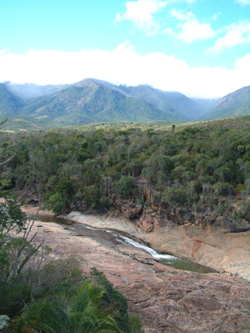
Andohahela National Park in southern Madagascar
The national parks of Madagascar include all officially recognized protected areas as of 2015. The protected areas network of Madagascar is managed by the Madagascar National Parks Association (PNM-ANGAP). The network includes three types of protected areas: Strict Nature Reserves ( IUCN category Ia), National Parks (IUCN category II) and Wildlife Reserves (IUCN category IV). At the 2003 IUCN World Parks Congress in Durban, the Malagasy President, Marc Ravalomanana, announced an initiative to more than triple the area under protection from approximately 17,000 km2 (6,600 sq mi) to over 60,000 km2 (23,000 sq mi) (from 3% to 10% of Madagascar's area). This " Durban Vision", as it has been dubbed, involved broadening the definition of protected areas in the country and legislation has been passed to allow the creation of four new categories of protected area: Natural Parks (IUCN category II), Natural Monuments (IUCN category III), Protected Landscapes (IUCN category V), and Natural Resource Reserves (IUCN category VI). As well as allowing these new objectives for protected areas management, the new legislation also provided for entities other than PNM-ANGAP to manage protected areas, such as government ministries, community associations, NGOs and other civil society organizations, and the private sector. ( Full article...) -
Image 10
Cape Spencer Lighthouse, Innes National Park
Protected areas of South Australia, consisting of protected areas located within South Australia and its immediate onshore waters and which are managed by South Australian Government agencies. As of 2018, South Australia contained 359 separate protected areas declared under the National Parks and Wildlife Act 1972, the Crown Land Management Act 2009 and the Wilderness Protection Act 1992. Together, they cover a total land area of 211,387.48 km2 (81,617.16 sq mi) or 21.5% of the state's area. ( Full article...) -
Image 11Protected areas of Australia include Commonwealth and off-shore protected areas managed by the Australian government, as well as protected areas within each of the six states of Australia and two self-governing territories, the Australian Capital Territory and the Northern Territory, which are managed by the eight state and territory governments.
Commonwealth and off-shore protected areas in the Australian Capital Territory, the Northern Territory, the Christmas Island Territory, the Cocos (Keeling) Islands Territory, the Norfolk Island Territory and the Australian Antarctic Territory are managed by Director of National Parks, an agency within the Department of the Environment and Energy, with the exception of the Great Barrier Reef Marine Park, which is managed by the Great Barrier Reef Marine Park Authority, a separate body within the department. ( Full article...) -
Image 12Queensland is the second largest state in Australia. As at 2020, it contained more than 1000 protected areas. In August 2023, it was estimated a total of 14.5 million hectares or 8.38% of Queensland's landmass was protected. ( Full article...)
-
Image 13Protected areas of Estonia are regulated by the Nature Conservation Act ( Estonian: Looduskaitseseadus), which was passed by the Estonian parliament on April 21, 2004 and entered into force May 10, 2004.
Overall Estonia has 15403 protected areas covering 21% of the country land and 18% of it marine and coastal territory, including 6 national parks: Lahemaa National Park, Karula National Park, Soomaa National Park, Vilsandi National Park, Matsalu National Park, and Alutaguse National Park ( Full article...) -
Image 14

Network of protected areas in Albania (2020)
Despite being a relatively small country, Albania is exceedingly rich in biodiversity. Its ecosystems and habitats support over 5,550 species of vascular and non-vascular plants and more than 15,600 species of coniferous and non-coniferous evergreens, most of which are threatened at global and European levels. The country has made recent efforts to expand its network of protected areas which now include: 11 national parks, 1 marine park, 718 nature monuments, 23 managed nature reserves, 11 protected landscapes, 4 World Heritage Sites, 4 Ramsar sites and other protected areas of various categories, that when combined, account for 21.36% of the territory. Furthermore, a biosphere reserve, 45 important plant areas and 16 important bird areas are found in the country.
Meanwhile, the central government has proclaimed the Coastline and the Tirana Greenbelt as areas of national importance. ( Full article...) -
Image 15A National Biodiversity Conservation Area (NBCA) is an environmentally protected area in Laos. There are all together 21 different NBCAs in Laos, protecting 29,775 square kilometers. Another 10 NBCAs have been proposed, many of them being treated by authorities as though they were already officially protected. ( Full article...)
Selected world maps
-
Image 1 Time zones of the world
-
Image 2Index map from the International Map of the World (1:1,000,000 scale)
-
Image 3The world map by Gerardus Mercator (1569), the first map in the well-known Mercator projection
-
Image 4United Nations Human Development Index map by country (2016)
-
Image 5A plate tectonics map with volcano locations indicated with red circles
-
Image 61516 map of the world by Martin Waldseemüller
-
Image 7 Mollweide projection of the world
-
Image 8Only a few of the largest large igneous provinces appear (coloured dark purple) on this geological map, which depicts crustal geologic provinces as seen in seismic refraction data
-
Image 9The Goode homolosine projection is a pseudocylindrical, equal-area, composite map projection used for world maps.
World records
- List of Olympic records in athletics
- List of world records in athletics
- List of junior world records in athletics
- List of world records in masters athletics
- List of world youth bests in athletics
- List of IPC world records in athletics
- List of world records in canoeing
- List of world records in chess
- List of cycling records
- List of world records in track cycling
- List of world records in finswimming
- List of world records in juggling
- List of world records in rowing
- List of world records in speed skating
- List of world records in swimming
- List of IPC world records in swimming
- List of world records in Olympic weightlifting
Continents of
Earth | ||||||||
|---|---|---|---|---|---|---|---|---|
| ||||||||
| ||||||||
| ||||||||
|
Cenozoic Era (present–66.0 Ma) |
| ||||||||||||
|---|---|---|---|---|---|---|---|---|---|---|---|---|---|
|
Mesozoic Era (66.0–252 Ma) |
| ||||||||||||
|
Paleozoic Era (252–539 Ma) |
| ||||||||||||
|
Proterozoic Eon (539 Ma–2.5 Ga) |
| ||||||||||||
| Archean Eon (2.5–4 Ga) | |||||||||||||
| Hadean Eon (4–4.6 Ga) | |||||||||||||
ka = kiloannum (thousands years ago);
Ma = megaannum (millions years ago);
Ga = gigaannum (billions years ago). See also: Geologic time scale • | |||||||||||||
| City proper | |
|---|---|
| Metropolitan area | |
| Urban area/ agglomeration | |
| Historical | |
| Related articles | |
| Locations | ||
|---|---|---|
| Related | ||
| Retrospectively recognized expositions | |||||||||||||
|---|---|---|---|---|---|---|---|---|---|---|---|---|---|
| BIE-recognized Universal expositions | |||||||||||||
| BIE-recognized specialized expositions |
| ||||||||||||
| BIE-recognized horticultural exhibitions (AIPH) | |||||||||||||
| Not BIE- recognized |
| ||||||||||||
†Postponed to 2021 due to the
COVID-19 pandemic | |||||||||||||
Carnival around the world | ||
|---|---|---|
| Asia | ||
| Europe | ||
| North America | ||
| Caribbean |
| |
| South America |
| |
| Oceania | ||
| Confederations | |
|---|---|
| World Championships | |
| World Cup | |
| Special events | |
| Presidents |
|
| Awards | |
| |||||||||||||||||||
| |||||||||||||||||||
| |||||||||||||||||||
Economic classification of countries | |||||
|---|---|---|---|---|---|
| Three-World Model | |||||
| Gross domestic product (GDP) |
| ||||
| Gross national income (GNI) | |||||
| Wages | |||||
| Wealth | |||||
| Other national accounts | |||||
| Human development | |||||
| Digital divide | |||||
|
Net international investment position (NIIP) | |||||
| Technological |
| ||||
|---|---|---|---|---|---|
| Sociological | |||||
| Ecological |
| ||||
| Biological |
| ||||
| Astronomical | |||||
| Eschatological |
| ||||
| Others |
| ||||
| Fictional | |||||
| Organizations | |||||
| Theatres |
| ||||||||||||||||||
|---|---|---|---|---|---|---|---|---|---|---|---|---|---|---|---|---|---|---|---|
Principal participants |
| ||||||||||||||||||
| Timeline |
| ||||||||||||||||||
| Aspects |
| ||||||||||||||||||
| General |
| ||||||||||||||||
|---|---|---|---|---|---|---|---|---|---|---|---|---|---|---|---|---|---|
| Participants |
| ||||||||||||||||
| Timeline |
| ||||||||||||||||
Categories
Wikimedia
The following Wikimedia Foundation sister projects provide more on this subject:
-
Commons
Free media repository -
Wikibooks
Free textbooks and manuals -
Wikidata
Free knowledge base -
Wikinews
Free-content news -
Wikiquote
Collection of quotations -
Wikisource
Free-content library -
Wikispecies
Directory of species -
Wikiversity
Free learning tools -
Wikivoyage
Free travel guide -
Wiktionary
Dictionary and thesaurus
More portals
- Pages using the Phonos extension
- Portals with undated maintenance templates
- Manually maintained portal pages with no date
- All manually maintained portal pages
- Portals with triaged subpages
- All portals with triaged subpages
- Portals with named maintainer
- Automated article-slideshow portals with 201–500 articles in article list
- Pages with Brazilian Portuguese IPA
- Pages including recorded pronunciations
- Automated article-slideshow portals with 101–200 articles in article list
- Portals needing placement of incoming links
